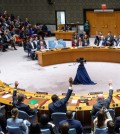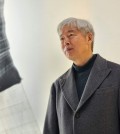- California Assembly OKs highest minimum wage in nation
- S. Korea unveils first graphic cigarette warnings
- US joins with South Korea, Japan in bid to deter North Korea
- LPGA golfer Chun In-gee finally back in action
- S. Korea won’t be top seed in final World Cup qualification round
- US men’s soccer misses 2nd straight Olympics
- US back on track in qualifying with 4-0 win over Guatemala
- High-intensity workout injuries spawn cottage industry
- CDC expands range of Zika mosquitoes into parts of Northeast
- Who knew? ‘The Walking Dead’ is helping families connect
Presidential nominees lay out directions for constitutional revision

National Assembly Speaker Chung Sye-kyun (C) and presidential candidates — Sim Sang-jeung (L) of the Justice Party, Moon Jae-in of the Democratic Party (2nd from L) and Ahn Cheol-soo (2nd from R) of the People’s Party — pose for a photo before their talks on a constitutional revision at the National Assembly in Seoul on April 12, 2017. (Yonhap)
SEOUL, April 12 (Yonhap) — Major presidential contenders on Wednesday put forward their differing proposals for a constitutional revision aiming to address the current concentration of power in a single national leader, a situation long blamed for corruption and political polarization.
A special parliamentary panel on the revision invited leading presidential candidates, including Moon Jae-in of the liberal Democratic Party and Ahn Cheol-soo of the center-left People’s Party, to listen to their views on altering the basic law last amended in 1987.
Moon called for changing the current single-term, five-year presidency into a renewable four-year presidency, saying that the change would help ensure consistent policy implementation with long-term visions.
He also proposed that the next presidential election be held in tandem with the local gubernatorial and mayoral elections in 2022, and that from that year on, the first four-year presidential term would begin.
Moon, in addition, stressed the need to delegate some of the central government’s authority to provincial governments and establish a new Cabinet meeting involving the leaders of provinces and major cities.
In his statement submitted to the panel, Hong Joon-pyo, the presidential candidate of the conservative Liberty Korea Party, backed Moon’s proposal for instituting the four-year presidency that allows a second term. Hong, in particular, called for a government model designed to decentralize presidential powers by delegating part of them to the prime minister.
Hong also proposed reorganizing the current unicameral legislature into a bicameral one, reducing the total number of lawmakers and removing their privileges such as immunity from arrest.
Ahn did not put forward any specific government model, saying that he is open to “all possibilities,” including a model featuring limited presidential authority or a semi-presidential system in which the prime minister, picked by the parliament, handles domestic state affairs. But he did oppose a parliamentary cabinet system like in Japan, saying it is “premature” to apply the system to Korea. He cited a lack of public support for a legislature mired in relentless factional, partisan and ideological feuds.
Sim Sang-jeung of the progressive Justice Party stressed that the constitutional revision should be carried out in a way that strengthens citizens’ fundamental social and economic rights. She criticized the fact that the ongoing debate on the revision focuses too much on the country’s power structure.
The National Assembly launched a special committee in December to discuss the revision of the Constitution, which critics say has failed to embrace social and political changes that have transpired since the last change designed to limit authoritarian rulers from prolonging their presidency.











